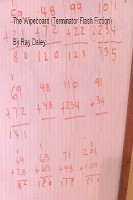Science Fiction | The Wipeboard (Terminator Flash Fiction) | Ray Daley
Science Fiction | The Parable of the Paperclip Maximiser | Yonatan Zunger
Science Fiction | The Parable of the Paperclip Maximiser | Yonatan Zunger
 The Wipeboard is a technically well-written piece of flash fiction, rather cleverly done. A quick two-minute read. However, it didn't add anything to the Terminator world, and it was unsatisfyingly implausible, as I shall go deeper into in this review that is, ironically, longer than the reviewed story.
The Wipeboard is a technically well-written piece of flash fiction, rather cleverly done. A quick two-minute read. However, it didn't add anything to the Terminator world, and it was unsatisfyingly implausible, as I shall go deeper into in this review that is, ironically, longer than the reviewed story.It's going to be difficult to write this without spoilers, but you already know the Terminator world. Humans are fighting the machines, which want to wipe out humanity. In the movies, the humans win, just barely.
The movies have this incoherent understanding of machine intelligence which is rather pervasive in Hollywood and other fast-food entertainment: machines suddenly 'come alive' or 'wake up' and behave like badly brought up brats with deadly weapons and invincible armour. Their 'intelligence' is like nothing so much as a human movie villain's, one that wants destruction for the sake of destruction. There are often stupid and paranoia-creating conversations between machine (I am invincible, you cannot win) and humans (fuck you, machine, take that, and that). Why would that ever happen if the machines were as 'humanly' clever as that? Any machine control is that much faster than humans. If the 'alive' machines 'decided' to wipe out humanity, it would not be all that difficult. Nobody is going to beat an automated gun to the draw.
But really, no, that's never going to happen. Because that's not how machine intelligence works. As Isaac Asimov once pithily put it, machines are developed to do things humans find difficult or boring.
You do, however, have humans who are so clever that they want to test the limits of their own cleverness by making machines that mimic humans more closely. Yet, unless you code in evil intent, the machines will never be evil, no matter how 'intelligent' they get.
You can, most certainly, come to grief much more subtly, as The Parable of the Paper Clip Maximiser by Yonatan Zunger brings out with such bland black humour. This story is in two layers. A parable on AI and a parable on capitalism.
But if, somehow, some too-clever-for-their-own good human does indeed invent Skynet the evil humanity-killing machine, I assure you that the subsequent destruction by nuclear explosions would not leave in place anywhere near the necessary human intellectual capital, equipment or layers upon layers of highly specialised learning that could create machine intelligence in the first place. Nope, if you make Skynet and let it loose, forget humanity ever coming back.
Which is why Ray Daley's sharp little flash fiction set in the Terminator world left me shaking my head sadly, despite its writing virtuosity.
Want to read?
The Parable of the Paperclip Maximizer (free)
The Wipeboard (free)
No comments:
Post a Comment